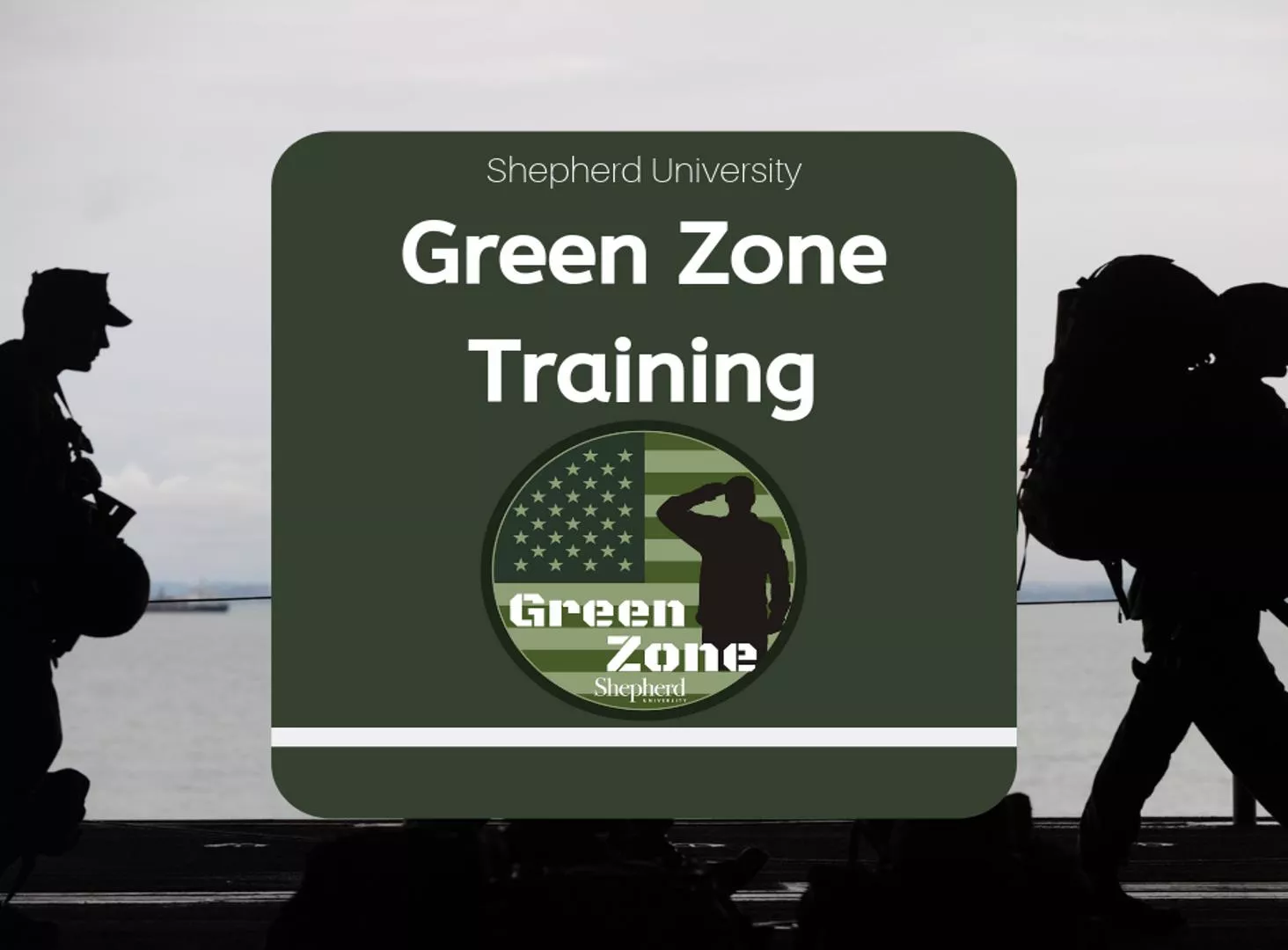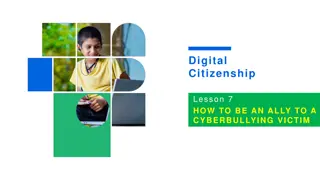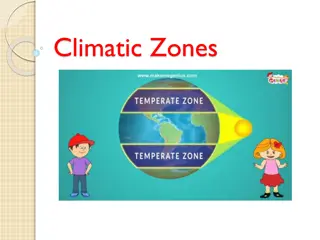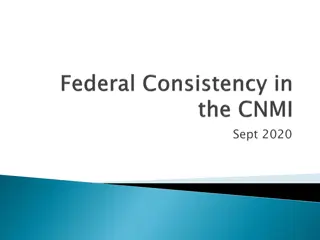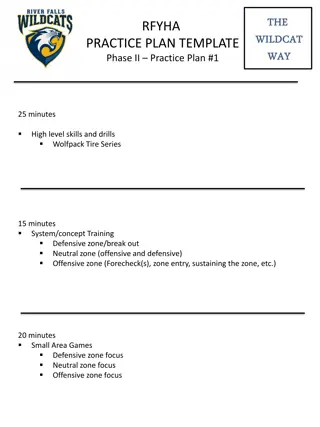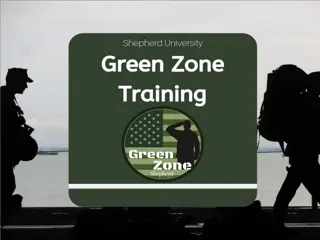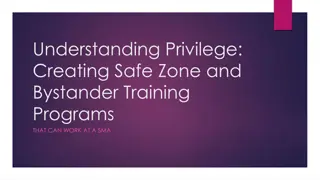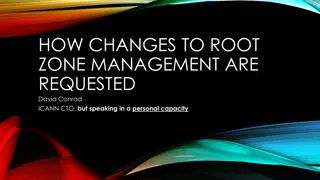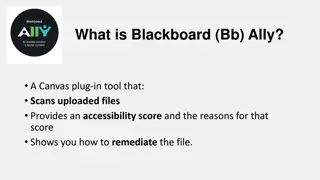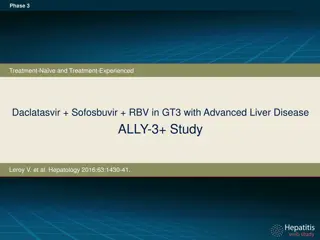Comprehensive Green Zone Ally Training
Participants in the Shepherd University Green Zone Training will gain a thorough understanding of the responsibilities of a Green Zone Ally, insight into the military experience and emotional phases of deployment, and awareness of the challenges that student veterans may encounter. The training aims to equip individuals with the knowledge and tools needed to effectively support and engage with student veterans within the university community.
Download Presentation

Please find below an Image/Link to download the presentation.
The content on the website is provided AS IS for your information and personal use only. It may not be sold, licensed, or shared on other websites without obtaining consent from the author.If you encounter any issues during the download, it is possible that the publisher has removed the file from their server.
You are allowed to download the files provided on this website for personal or commercial use, subject to the condition that they are used lawfully. All files are the property of their respective owners.
The content on the website is provided AS IS for your information and personal use only. It may not be sold, licensed, or shared on other websites without obtaining consent from the author.
E N D
Presentation Transcript
Shepherd University Green Zone Training
OBJECTIVE Participants will: Understand the expectations of a Green Zone Ally Become familiar with the military experience and emotional cycle of deployment Become familiar with the potential issues facing student veterans and active service members as they transition from the military to campus Become aware of the resources available to student veterans and active service members on our campus and off campus Understand Shepherd University s Veteran Demographics
What is A Green Zone Ally? Staff, faculty, and students who identify themselves as: Someone who knows something about the issues and concerns facing student veterans Someone who can help students find appropriate resources An understanding ear Not expected to be experts
Todays Veterans Not all veterans are veterans of foreign wars or combat veterans So what is a veteran? Federal Law states that a veteran is anyone that has been discharged honorably from the armed forces.
Shepherd University Veteran Demographics Fall 2018-2.9% of the total student population 108 Students Identified as being a Veteran 86 Men 22 Women Spring 2019-2.95% of the total student population 93 Students Identified as being a Veteran 74 Men 19 Women
Military Experience: Deployments Deployments last from 6-18 months Multiple deployments Some serve more than one deployment before being discharged from the military Over 350,000 have experienced two or more deployments Emotional Cycle of Deployment: Pre-Deployment Deployment Sustainment Re-Deployment Post-Deployment
Family Members/Dependents Family Members or dependents also experience challenges Birth of a child while their spouse/dependent is away Readjusting to life without spouse
Veteran Students Strengths Veterans/Active Service Members (ASMs) transitioning out of the military onto college campuses bring a unique perspective Military training Life experience Established identity A more worldly view Skills taught in the military help students to be successful Leadership Motivation Time management Work ethic Stress management
Marketable Skills 1.Accelerated learning curve 2.Understanding of leadership 3.Ability to work on a team 4.Experiences with diversity and inclusion 5.Efficient performance under pressure 6.Respect for procedures 7.Experience with advanced technology and international trends 8.Integrity 9.Consciousness of health and safety standards 10.Triumph over adversity
Transition Challenges Translating military skills into a new profession or into college credits Adjusting to a new focus unrelated to military experience Course articulation difficulty Using the GI Bill Being an older student Freshman 24+ years old with 18 year old classmates Living off campus Feeling isolated from classmates Alienation Life experiences within the military differ significantly from most other students and faculty Insensitivity of classmates, faculty, and others on campus in regards to discussion of war and military Veterans/ASMs may not agree with discussions or may feel attacked when asked about their experience Issues during transition MAY become barriers to success
Transition Challenges CONT. Things to keep in mind about student veterans in the classroom: Some MAY: Have difficulty relating to classmates Find loud noises disturbing Become anxious with changes in the classroom Have excessive absences Have Post Traumatic Stress Disorder or Traumatic Brain Injury
Students with Disabilities It is estimated that 23% to 31% of Veterans/Active Service Members of Operation Iraqi Freedom or Operation Enduring Freedom have PTSD symptoms and 20% have mild TBIs. New disability May not want to identify as having a disability
Wounds of War Not all wounds/injuries are combat related Not all wounds are visible Spinal Cord Injury (SCI) Military Sexual Trauma (MST) Post-Traumatic Stress Disorder (PTSD) Traumatic Brain Injury (TBI)
Spinal Cord Injury (SCI) Student may have difficulty with mobility around campus
Military Sexual Trauma (MST) Psychological trauma, which in the judgment of a VA mental health professional, resulted from a physical assault of a sexual nature, battery of a sexual nature, or sexual harassment which occurred while the Veteran was serving on active duty or active duty for training. Symptoms Strong emotions Depression, Irritability Trouble sleeping Problems in relationships Both male and female veterans can experience MST
Post-Traumatic Stress Disorder (PTSD) PTSD occurs after an individual has seen or experienced a traumatic event that involved the threat of injury or death PTSD is experienced by some, but certainly not all Student Veterans/ASMs Symptoms Repeated "reliving" of the event, which disturbs day-to-day activity Flashback episodes, where the event seems to be happening again and again Avoidance Emotional "numbing," or feeling as though you do not care about anything Arousal Excess awareness (hypervigilance) MST can also contribute to PTSD
PTSD in the Classroom Student MAY: Sit in the back of the classroom Be easily startled by noises Be withdrawn from class discussion Have difficulty maintaining emotional control during difficult topics Have a service animal for support Remember: Although many veterans may have stressful or traumatic experiences, not all develop Post-Traumatic Stress Disorder. Help end this assumption!
Traumatic Brain Injury (TBI) A blow or jolt to the head or a penetrating head injury that disrupts the function of the brain. Severity of injury can vary Mild: brief change in mental status or consciousness Severe: extended period of unconsciousness or amnesia after the injury
TBI CONT. Top three causes: Car accidents Firearms Falls TBI often goes undiagnosed because symptoms may not appear until weeks later Especially emotional or personality changes which are difficult for strangers to identify Difficult to differentiate between TBI and PTSD because they have several overlapping symptoms
TBI Symptoms Symptoms Cognition Motor/Sensory Disturbances Impairments in: Communication Concentration/ Memory Speed of Information Processing Judgment Decision-Making Problem-Solving
TBI in the Classroom Students MAY: Have difficulty expressing themselves Constant fidgeting and tapping pens or feet Becoming aggressive, easily irritated, agitated, or insensitive to others in the classroom Be withdrawn or not participating in class discussion May need info repeated or written down
Potential Classroom Scenarios A veteran may be tardy or absence from class due to a Veteran Affairs Hospital (VA) appointment.(Getting a VA appointment can be like winning the lottery) A veteran may feel uncomfortable when discussing contemporary political events so foreworn them prior to a discussion occurring Classroom disturbances and off task behavior can be very distracting for a veteran that is used to focusing on a mission Treating a veteran like an 18 year old college student can create an uncomfortable situation for a veteran
Top Ten Green Zone tips Realize veterans are nontraditional students, a special population of financially independent adults often juggling family, work, and studies. Be aware that not all the veterans in your classroom are male. More women are serving, and are almost as likely as their male counterparts to have experienced firsthand traumas of war. One in four veteran students are women. Veterans generally possess discipline, structure, and a strong work ethic. Remember that the military teaches team connection and completion skills. With some awareness and sensitivity on the instructor s part, veteran life experiences become assets, adding to the diversity of perspectives represented in classrooms. These life experiences can help both veterans and nonveterans gain a broader, more nuanced perspective on the world or class subject. A secured classroom can provide veterans with feelings of safety. Veterans may be sensitive to triggers such as surprises, loud noises, and chaos. Be cautious about images of injury, dismemberment and death, and provide advanced warning before displaying such images.
Top Ten Green Zone tips Contd. Veterans view the instructor as the leader of the classroom and typically respect decisiveness. Treat veterans as adults, as this is what they expect. Instructors should have effective classroom management policies in place. Veterans may be reluctant to talk about their military experiences. Conversely, some may inadvertently dominate class discussions, in which cases boundaries for the nature and quantity of class participation need to be set, preferably in private, without calling the student out in front of the class. Don t try to relate to experiences that you don t share if you haven t been in combat, don t pretend that you understand what it or its aftermath is like. Keep the syllabus (mission) clear with specific tasks and dates. Be available for assistance and added support or referral. Veterans may not easily admit when they are struggling. Understand that not everything in these Top Ten tips applies to every veteran. They are all unique individuals with unique needs, and we do not want to engage in false assumptions about veterans. One example of how you can help is to use the resources provided on this page to refer veteran student to services on campus. It is helpful to confirm that you are referring correctly by making a phone call before sending the student to the referral source.
Examples of Acceptable Questions to ask a Veteran What branch did you serve in? Where were you stationed? How long did you serve? What did you do (in the Army, Navy, Marines, Coast Guard, Air Force, Guard, or Reserves)? Why did you choose that branch? Do you come from a military family? Did you visit any other countries? Where was your favorite place you lived? How s your family doing? What do you do outside of work? Play any sports
Examples of Questions to not ask a Veteran Have you ever killed someone? What did it feel like to kill someone? Do you agree with the President or do you think we should have stayed out of (Iraq, Afghanistan)? Is it hard to get back to real life after being in the military? How could you leave your family for so long? What s the worst thing that happened to you? Were you raped?
What Green Zone allies should know Do not ask or suggest that the student veteran/ASM has a disability but inquire about their issues and concerns Become familiar with information provided by the Student Disability Services and Campus Counseling for those who may request such services Students may need extra help navigating the system and understanding what help is available to them Some students may be averse to seeking help due to stigma and issues with continued military service.
Shepherd University Veteran Resources Mary Beth Myers/ Student Veteran Services Email: mwalling@shepherd.edu Phone: 304-876-5325 Shannon Zimmerman/ GI Bill Certifying Officer Email: szimmerm@shepherd.edu Phone: 304-876-5463 Robert Hardin/ Shepherd University Student Veteran Organization President Email: rhardi01@rams.shepherd.edu
Veteran Resources CONT. Shepherd University has a Veteran Center located in Gardiner Hall The Shepherd University Student Veteran Organization(SUSVO) meets in the Veteran Center on Wednesdays at 1:30 p.m. Anyone is welcome to attend SUSVO meetings Counseling Center located in Gardiner Hall Ext. 5161 for appointments Health Center located in Gardiner Hall Ext. 5161 for appointments Accessibility Services located in Gardiner Hall Ext. 5122 for appointments
Veteran Resources CONT. Team River Runner https://www.shepherd.edu/veterans/trr- shepherd Veterans to Agriculture Program https://www.shepherd.edu/veterans-to- agriculture-program/
Off Campus Veteran Resources Veterans Administration Medical Center 510 Butler Ave. Martinsburg WV 25401 304-263-0811 Martinsburg Vet Center 300 Foxcroft Ave., Suite 100A Martinsburg, WV 25401 304-263-6776
References American Foundation for Suicide Prevention. (2010). http://www.afsp.org American Psychiatric Association. (2000). Diagnostic and statistical manual of mental disorders (4th ed., text rev.). Washington, DC: Author. Center for Disease Control and Prevention (2009). http://www.cdc.gov Citro n,L. (2018). What to Ask and Not Ask Military Veterans. Retrieved from: https://www.military.com/hiring- veterans/resources/what-to-ask-and-not-ask-military-veterans.html Gewirtz, A., DeGarmo, D., Polushy, M., Khaylis, A., & Erbes, C. (2010). Post-traumatic stress symptoms among National Guard soldiers deployed to Iraq: Associations with parenting and Clinical Psychology, 78(5), 599-610. Franklin, K. (2009). Understanding the challenges of marriage, parenting, and family life for returning veterans and military families: The Deployment Cycle and Reintegration Challenges. Hoge, C., Castro, C., Messer, J., McGurk, D., Cotting, D., & Koffman, R. (2004). Combat duty in Iraq and Afghanistan: Mental health problems and barriers to care. New England Journal of Medicine, 35(1), 13-22. Hoge, E.A., Austin, E.D. & Pollack, M.H. (2007). Resilience: Research evidence and conceptual considerations for posttraumatic stress disorder. Depression and Anxiety, 24, 139-152. Howell, T. (n.d.). 5 Must Know GI Bill Facts. http://www.military.com/education/gi-bill/5-must-know-gi-bill-facts.html Jones, K., Young, T., & Leppma, M. (2010). Mild traumatic brain injury and post traumatic stress disorder in returning Iraq and Afghanistan war veterans: Implications for assessment and 88(3), 372-376. 66 Kreuter, N. (2012, November 12). Veterans in the Classroom. Inside Higher Ed, Tyro Tracts. Lawrence Jr., C. (2013). Veterans day: Top 10 reasons to hire a military veteran. ABC News. Retrieved from http://abcnews.go.com/US/veterans-day-top-10-reasons-hire-military- Mundt., J. (2009). PTSD in the new generation of combat veterans from Iraq and Afghanistan: What the non-VA clinician needs to know. Medical Educational Services Ins. Professional Newbold, L., & Balmer, T.D. (2012, November 30). Combat to College. Presentation at the Statewide Conference on Serving Student Veterans, Edmond, OK. Pfeffer, D. (2010). Quality Instructional Services for Veterans And Military Family Members, Webinar. behaviors and couple adjustment. Journal of Consulting diagnosis. Journal of Counseling and Development, veteran/story?id=20814395 Development Network. Eau, WI.
References Oklahoma University.(2019). Green Zone Training. Retrieved From: http://www.ou.edu/veterans/green- zone/green_zone_training Powers, R. U.S. Military 101 The Basics of the United States Military. Usmilitary.about.com. Retrieved July 2, 2014 from http://usmilitary.about.com/cs/generalinfo/a/military101.htm Santrock., J. (2005). Adolescence. McGrawHill. New York, NY. Savych, B. (2009). Effects of deployment on spouses of military personnel. Humanities and Social Sciences, 3295. SCAAFSA. (2017). Green Zone Training. Retrieved from: https://www.scasfaa.org/resources/Pictures/Green%20ZonePPTSP2017.pdf Schupp., J. (2010). SERV VCU. Supportive education for the returning veteran. Helping Virginia s Best, Brightest, and Bravest get their degree, Webinar. Spinal Cord Injuries. (2010). Shepherd University Institutional Research Spinal Cord Injury Information. (n.d.). http://www.pva.org/site/c.ajIRK9NJLcJ2E/b.6344373/k.4182/Spinal_Cord_Injury_Information.htm Thomas, J. Wilk, J. Riviere, L., McGurk, D., Castro, C., Hoge, C. (2010) Prevalence of mental health problems and functional impairment among active component National Guard soldiers 3 following combat in Iraq. Archives of General Psychiatry, 67(6), 614-623. TraumaticBrainInjury.com. (2010). www.traumaticbraininjury.com VA MST. (2010). www.mentalhealth.va.gov/msthome.asp VCU. (2010). Veteran s Census; Fall 2010. Veterans Services University of South Carolina (2014). http://www.sa.sc.edu/veterans/ www.sci.va.gov and 12 months


